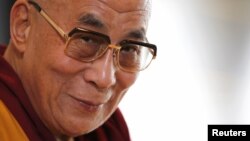The Dalai Lama says China's new leader will likely embark on political reforms to leave his mark on the nation the way the current leadership has done with economic reforms.
Speaking to reporters Monday during a pastoral visit to Japan, the exiled Tibetan spiritual leader said China is already reforming its economy. He said the only area left for expected incoming president Xi Jinping to reform is the country's politics.
"Now Hu Jintao's era past, now Xi Jinping coming president," he said. "I think there's no alternative except some political change, so political reform. Economy reform already there, so lot of sort of development. So that's also brought some good things."
Xi, currently vice president, is expected to take over from President Hu Jintao as Communist Party head at a party congress opening in Beijing Thursday. He would then become president in March in a generational leadership change.
The Dalai Lama acknowledged that economic reforms had produced benefits for China, but said the resort to force by the authorities was at odds with their aim of creating a "harmonious society."
"Using force brings suspicion, fear. That's just opposite of harmony. So the goal, harmony, wonderful. Stability, wonderful. But method, use secrecy, censorship and bully,'' he said.
Beijing has accused the Dalai Lama of seeking independence and inciting violence in Tibet, including more than 60 self-immolations in and around the region since March 2011. Beijing denounces the self-immolations as acts by terrorists and criminals, while activists say they are protesting Beijing's heavy-handed rule in Tibet. The Dalai Lama has said he wants meaningful autonomy for the mountain region.
The exiled Tibetan spiritual leader said he hopes that if China becomes more democratic, it will also help resolve issues with its neighbors as well, such as the ongoing dispute between China and Japan over a group of islands claimed by both countries in the East China Sea.
"More democratic principles, then many issues can solve, at least reduce these problems. So this issue with the islands, I think can be much easier to deal," he said.
While most analysts say they do not expect to see any dramatic reforms from China’s new leaders right away, they say they do hope for more transparency.
Speaking to reporters Monday during a pastoral visit to Japan, the exiled Tibetan spiritual leader said China is already reforming its economy. He said the only area left for expected incoming president Xi Jinping to reform is the country's politics.
"Now Hu Jintao's era past, now Xi Jinping coming president," he said. "I think there's no alternative except some political change, so political reform. Economy reform already there, so lot of sort of development. So that's also brought some good things."
Xi, currently vice president, is expected to take over from President Hu Jintao as Communist Party head at a party congress opening in Beijing Thursday. He would then become president in March in a generational leadership change.
The Dalai Lama acknowledged that economic reforms had produced benefits for China, but said the resort to force by the authorities was at odds with their aim of creating a "harmonious society."
"Using force brings suspicion, fear. That's just opposite of harmony. So the goal, harmony, wonderful. Stability, wonderful. But method, use secrecy, censorship and bully,'' he said.
Beijing has accused the Dalai Lama of seeking independence and inciting violence in Tibet, including more than 60 self-immolations in and around the region since March 2011. Beijing denounces the self-immolations as acts by terrorists and criminals, while activists say they are protesting Beijing's heavy-handed rule in Tibet. The Dalai Lama has said he wants meaningful autonomy for the mountain region.
The exiled Tibetan spiritual leader said he hopes that if China becomes more democratic, it will also help resolve issues with its neighbors as well, such as the ongoing dispute between China and Japan over a group of islands claimed by both countries in the East China Sea.
"More democratic principles, then many issues can solve, at least reduce these problems. So this issue with the islands, I think can be much easier to deal," he said.
While most analysts say they do not expect to see any dramatic reforms from China’s new leaders right away, they say they do hope for more transparency.




